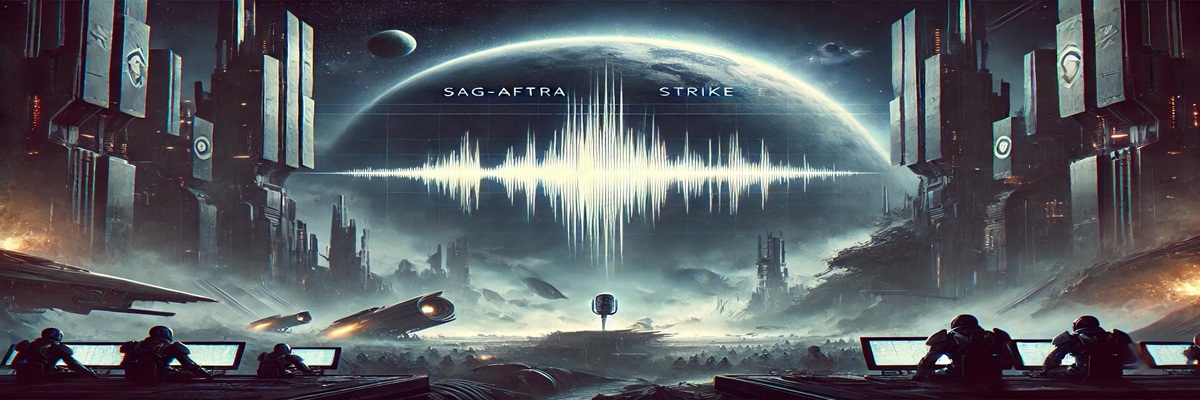As the video game industry continues to evolve, so too does the role of voice actors. These performers breathe life into the characters players interact with, adding depth to the gaming experience. However, in recent months, the ongoing SAG-AFTRA strike has cast a shadow over the industry, impacting upcoming releases. One such game affected by the strike is Destiny 2, with its final epilogue, Heresy, launching with some notable missing content.
The SAG-AFTRA Strike and Its Impact on the Industry
SAG-AFTRA, the union representing voice actors and other performers, voted to go on strike in July 2024 after failing to reach an agreement with major video game companies regarding fair compensation and the use of artificial intelligence. One of the key sticking points of the negotiations is how AI may be used to replicate voices without fair compensation to the original actors. While many companies have reached agreements with the union, some, including Destiny 2 developer Bungie, have yet to finalize terms.
This strike has left several upcoming games in limbo, with voice work either delayed or incomplete. In the case of Destiny 2: Heresy, the final epilogue in the game’s ongoing saga, Bungie announced that some voice lines would be missing from the release due to the strike. The developer acknowledged that although the game would still feature a full narrative, certain moments would lack voice acting, which could impact the overall experience.
Bungie’s Response: Subtitles and Warnings
Bungie has been transparent with players about the situation, ensuring that the narrative content of Heresy remains accessible despite the missing voice lines. To help players follow the story, the developer has made subtitles the default for the update. This way, players can still understand the context and meaning of the dialogue, even when it lacks voice acting.
Additionally, Bungie has added warnings in the game to inform players when they may encounter missing voice lines. These warnings will appear in activities where the content is impacted, and players will be encouraged to adjust subtitle settings if necessary. Although it is unclear whether the missing voice lines will be patched in at a later date if the strike resolves, Bungie is doing its best to ensure that the epilogue remains enjoyable for players.
The Legacy of Destiny 2 and Voice Acting
The Destiny 2 franchise has long been known for its rich storytelling and immersive gameplay. Since its release, the game has captivated players with its complex lore, well-developed characters, and, notably, its excellent voice acting. Many of the game’s most iconic characters, such as Eris Morn and Ikora Rey, are brought to life by talented voice actors who infuse their roles with emotion and depth. The absence of these voices in Heresy highlights just how essential voice acting is to the Destiny experience.
Players have come to expect high-quality performances in the game, and the strike’s impact on Heresy is a reminder of the crucial role voice actors play in bringing video games to life. The emotional weight behind the dialogue, the delivery of key plot points, and the overall immersion in the game world are all enhanced by the voices of talented actors. Without them, the narrative can feel hollow, leaving a noticeable gap in the player’s experience.
The Broader Implications for the Video Game Industry
The situation with Destiny 2 is not an isolated one. The SAG-AFTRA strike has far-reaching consequences across the gaming industry, affecting a wide range of upcoming titles. With the strike still ongoing, other game developers are also facing delays or compromises in their voice acting content. Some games have opted to delay their releases until agreements are reached, while others, like Destiny 2: Heresy, have moved forward with incomplete voice work.
The strike has brought attention to the growing role of AI in the gaming industry, and voice actors are concerned about the future of their craft. AI technologies are becoming more advanced, and some companies are exploring ways to use AI to replicate voices without compensating the original actors. This issue, along with concerns over pay and working conditions, has led to a standoff between voice actors and game companies.
For the industry as a whole, the strike highlights the importance of fair compensation and the need for agreements that protect the rights of performers. As more and more games rely on intricate storylines and complex characters, the need for talented voice actors remains as important as ever. Without them, the impact of the game’s story, emotion, and atmosphere would be severely diminished.
The Role of AI in the Future of Voice Acting
One of the key issues at the heart of the SAG-AFTRA strike is the use of AI to replicate voice actors’ performances. AI technology has made significant strides in recent years, and companies are increasingly looking to use it as a cost-saving measure. By training AI models on the voices of real actors, companies can potentially generate dialogue without the need for human performers.
While this technology may seem promising from a business perspective, it raises serious concerns for voice actors. AI cannot replicate the depth of emotion, timing, and nuance that a human actor brings to the table. As Hank Azaria, a seasoned voice actor known for his work on The Simpsons, pointed out, voice acting involves much more than just producing sounds—it’s about creating a believable performance that connects with the audience.
Moreover, AI-generated voices often lack the subtle expressions and imperfections that make human voices so compelling. Whether it’s a moment of laughter, a sigh, or the emotional weight of a single line, these small details are what make voice acting so powerful. AI may be able to mimic a voice, but it can never fully replicate the authenticity of a human performance.
The Future of Voice Acting in Gaming
As the debate over AI and fair compensation continues, it’s clear that the future of voice acting in gaming is uncertain. While some companies are pushing for AI-generated voices, many others recognize the irreplaceable value of human performers. The quality of voice acting in games like Destiny 2 is a testament to the importance of having skilled voice actors behind the mic. For players, the experience of hearing their favorite characters speak is an integral part of what makes the game immersive and emotionally engaging.
The ongoing strike and the controversy surrounding AI may push for changes in how the industry compensates and treats its performers. It’s essential for game developers to ensure that they are working under fair and equitable conditions, protecting the rights of voice actors and ensuring that AI is used responsibly.
Moving Forward: The Impact of the Strike on Destiny 2 and Beyond
As players dive into Destiny 2: Heresy, it’s important to remember the behind-the-scenes challenges that have affected the game’s release. While Bungie has done its best to ensure a smooth experience despite missing voice lines, the situation underscores the larger issues facing the industry. The strike is a reminder of the importance of fair treatment and compensation for voice actors, whose contributions are essential to the success of games like Destiny 2.
Looking forward, the future of voice acting in video games will likely continue to evolve. AI may play a role in certain areas, but it can never replace the heart and soul that human voice actors bring to the table. As the industry adapts, it’s essential for developers, actors, and fans to advocate for fair practices that protect the art of voice acting and ensure its continued role in creating memorable gaming experiences.

